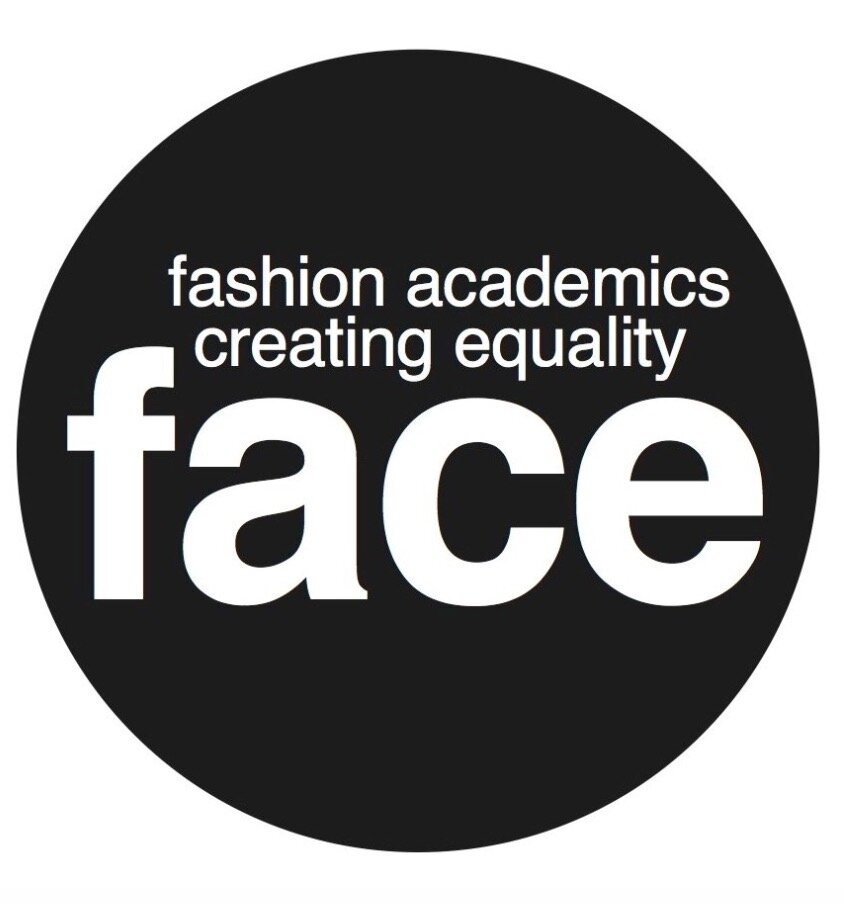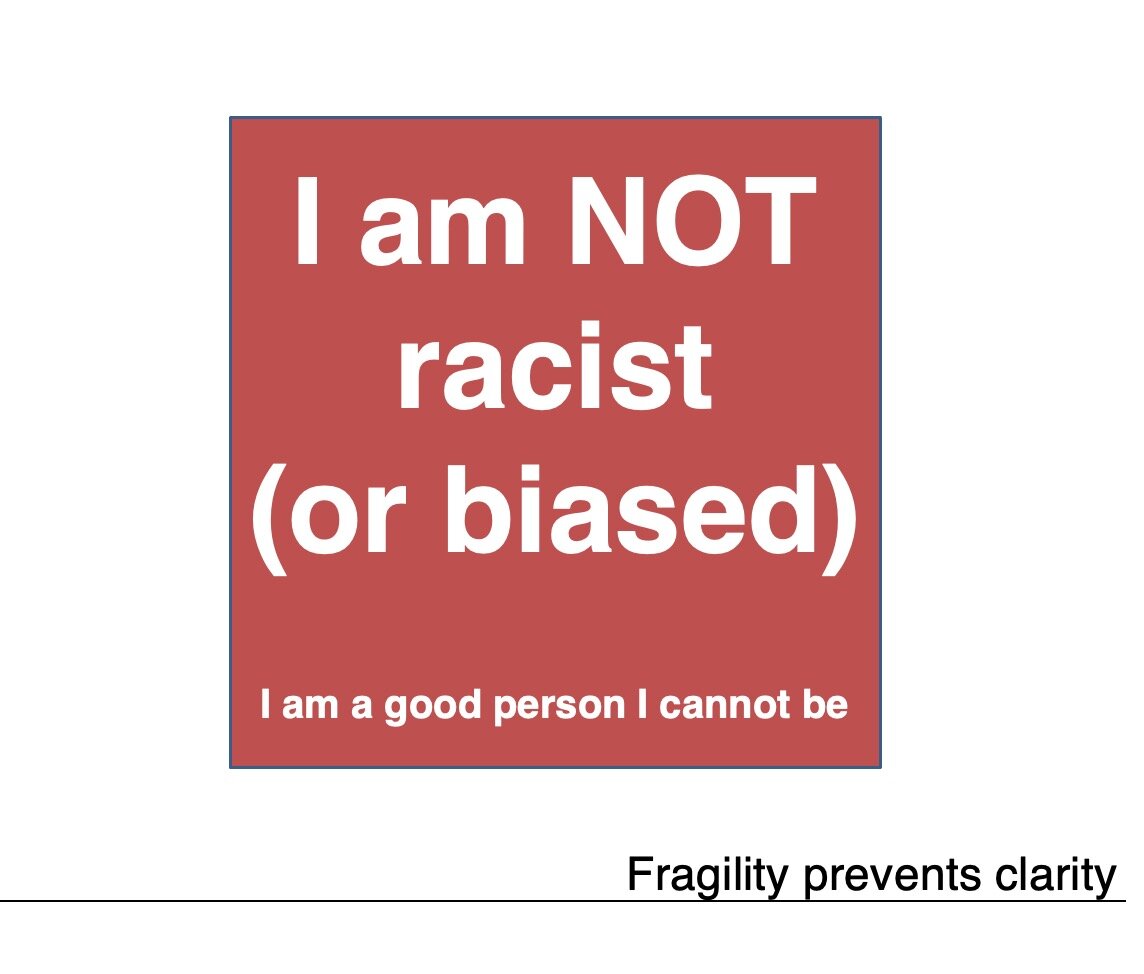FACE Race: Tools to intercept white denial
FACE RACE Teaching Resource: This companion page is one of many included in the Handbook. Download it here
These slides were created and presented by Caryn Franklin, visiting professor at Kingston School of Art for British Fashion Council Colleges FACE presentation, also Council for Higher Education Art and Design (CHEAD) FACE presentation both in 2021. We know these points below are still very relevant for white peers who are dealing with fragility: their own and that of others.
Denial and defending against internalised racism and white privilege is a pointless, self-centered exercise.
We think we are offended because we have been challenged? Our way of viewing the world is questioned. We are sheltering in a bubble, we are fearful of change or even being found lacking vital knowledge. Can we please get over ourselves and get curious. Learn and pass that learning on - this is surely the fundamental underpinning of our calling as educators?
Seeking the benefits that will come with our new cultural competency is our motivation for beginning this self reflective journey
“I don’t see colour /
Surely this is all in the past /
But this doesn’t apply to me /
I would never behave like that /
I’m offended by your accusation,”
No one is accusing us of the heinous acts that racism is responsible for, but we are complicit in a system that ignores racism. And we do benefit from white privilege.
Racism is not an insult it’s a condition we have been socialised into. Our white-centric experience and world view has anaesthetised us. It has dulled our brain and we are not thinking clearly. Fragility is reductive and negative, signifying a lack of resources for managing internal states.
Refusal to investigate our own limitations is not a sign of strength or conviction, rather a psychological weakness that must be addressed.
What we are really saying… “I choose to shield myself, erase reality, enjoy my unearned advantages and I give the burden back to those affected.
I choose ignorance and I shut down to feeling, learning and action.”
Meanwhile our colleagues and students are isolated, ignored and unsupported because we are not willing to acknowledge our complicity in maintaining a race unequal system.
When we place ourselves in a superior position, making ourselves intellectually and morally vulnerable to challenge, we set ourselves up. Why do that? No one is exempt from the social conditioning we receive from birth that ranks human beings according to skin-tone.
Practicing superiority or centering; Protesting exceptionalism, innocence, fragility, apathy; Performing saviourism, silence, white feminism, white gaze, privilege, entitlement, muting others, tone policing, getting angry, indignant, being a victim.
Give it up and let’s get involved with the change we want to see.
If we are uncomfortable – we could consider the feelings of our Black and Brown colleagues and students.
Black academics make up just 2% of the total working at UK universities. Just
0.7% of Professors are Black. White male professors’ number at 15,700, while Black female professors’ number at 25. Only 75 people on university governing bodies identified as Black from a group of 3,600.
And how does this impact choices and leadership?
OWN it! Emotion is a powerful motivator for action. Feel it to engage with the injustice. And yes we may experience some initial shame or self-loathing, when we look at our complicity and our disinterest previously. It’s the obvious thing to feel and is an authentic and vital response. But we can move through it towards purpose. Do the reading and the learning independently (see academic resources pertaining to the FACE Handbook here (Link to arrive in early 24). And checkout more general learning on our website under resources here
Jump in. Join us at FACE and let’s use our powerful feelings to drive positive change.
“Black people do not need allies. We need people to stand up and take on the problems borne of oppression as their own. We need people to use common sense to figure out how to participate in social justice.”
Roxane Gay, author: Bad Feminist, Hunger, Difficult Women, Untamed State, Ayiti
Studies show humility to be a valuable emotional-intelligence tool. Humility releases us from permanent self-focus, virtue signalling, pride, competitive ego, aggressive defending, shame, self-loathing. It makes us likeable, generous, mitigates stress, is associated with greater group status, helps repair and maintain relationships.
And how to go forward? We can remain in, and return to, a learning position. We must always be open to learning as academics; curiosity is our rocket fuel.
Humility is a superpower helping us to leverage our privilege and power for effective challenge to systematic racism and individual denial.
PROBLEM SOLVING AND HIGHER CREATIVITY
Leicht, Randsley de Moura, & Crisp (2014).
COMPETITIVE ADVANTAGE
Hunt, Leyton, & Prince (2014).
HIGHER PROFITABILITY
Gender and racial diversity on executive teams correlated with between 25% and 36% percent above-average profitability. Mckinsey & Company (2019)
And yes there are more gains. As the studies above show, each one of us can access opportunities for better problem solving and higher creativity, because, amongst diverse perspectives or as psychology labels this “engagement with counter stereotypes,” we experience lesser reliance on heuristic thinking (the way we’ve always done things). Our brain is processing differently (enhanced cognitive flexibility and creativity) and this leads to new ideas and ways of doing things.
We can expect competitive advantage too. There is a statistically significant relationship between greater inclusion, diverse identities/perspectives AND...better financial performance, improved customer orientation, employee satisfaction.
And what’s not to love about about a future practice, where we each, as curious, driven, purposeful academics experience our best selves? AND give the best of ourselves to our students whilst working towards a future free from race inequality and ignorance.
Discuss.
This presentation references Layla F Saad, Me and White Supremacy (2019) throughout. With thanks to co-founders Pascal Matthias, Sharon Lloyd and Andrew Ibi and all FACE members for the conversation.






